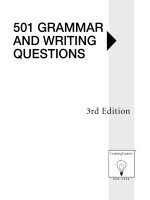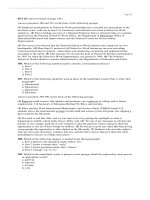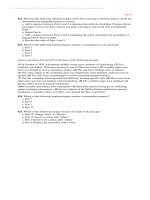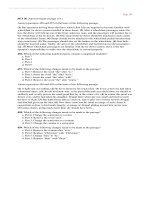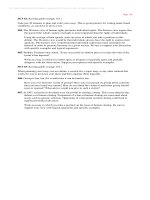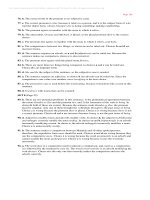501 GRAMMAR AND WRITING QUESTIONS 3rd Edition PHẦN 1 docx
Bạn đang xem bản rút gọn của tài liệu. Xem và tải ngay bản đầy đủ của tài liệu tại đây (87.34 KB, 14 trang )
501 GRAMMAR
AND WRITING
QUESTIONS501 GRAMMAR
AND WRITING
QUESTIONS
NEW YORK
3rd Edition
®
Copyright © 2006 LearningExpress, LLC.
All rights reserved under International and Pan-American Copyright Conventions.
Published in the United States by LearningExpress, LLC, New York.
Library of Congress Cataloging-in-Publication Data
501 grammar & writing questions.—3rd ed.
p. cm.
ISBN 1-57685-539-2
1. English language—Grammar—Examinations, questions, etc. 2. English language—
Rhetoric—Examinations, questions, etc. 3. Report writing—Examinations, questions,
etc. I. Title: 501 grammar and writing questions. II. Title: Five hundred one grammar
and writing questions. III. Title: Five hundred and one grammar and writing questions.
PE1112.A15 2006
428.2'076—dc22
2005035266
Printed in the United States of America
9 8 7 6 5 4 3 2 1
Third Edition
ISBN 1-57685-539-2
For more information or to place an order, contact LearningExpress at:
55 Broadway
8th Floor
New York, NY 10006
Or visit us at:
www.learnatest.com
INTRODUCTION vii
SECTION 1 Mechanics: Capitalization and Punctuation 1
SECTION 2 Sentence Structure 11
SECTION 3 Agreement 29
SECTION 4 Modifiers 43
SECTION 5 Paragraph Development 49
SECTION 6 Essay Questions 95
ANSWERS 103
Contents
v
The 501 grammar and writing questions included in
these pages are designed to provide you with lots of
practice. As you work through each set of questions,
you’ll be gaining a solid understanding of basic gram-
mar and usage rules. And all without memorizing!
This book will help you improve your language skills
through encouragement, not frustration.
An Overview
501 Grammar and Writing Questions is divided into
six sections:
Section 1: Mechanics: Capitalization and
Punctuation
Section 2: Sentence Structure
Section 3: Agreement
Section 4: Modifiers
Section 5: Paragraph Development
Section 6: Essay Questions
Each section is subdivided into short sets con-
sisting of 8–20 questions.
The book is specifically organized to help you
build confidence as you further develop your written-
language skills. 501 Grammar and Writing Questions
begins with the basic mechanics of capitalization
and punctuation, and then moves on to grammar and
sentence structure. By the time you reach the section
on paragraph development, you’ve already practiced on
almost 300 questions. You will then continue practic-
ing the skills you’ve already begun to master in the
previous four sections, this time, in combination.
When you get to the last section, you’ll be ready to
write your own essays.
How to Use This Book
Whether you’re working alone or helping someone
brush up on grammar and usage, this book will give
you the opportunity to practice, practice, practice.
Working on Your Own
If you are working alone to review the basics or prepare
for a test in connection with a job or school, you will
probably want to use this book in combination with a
basic grammar and usage text, or with Writing Skills
Success in 20 Minutes a Day. If you’re fairly sure of your
basic language-mechanics skills, however, you can use
501 Grammar and Writing Questions by itself.
Use the answer key at the end of the book not only
to find out if you chose the right answer, but also to
learn how to tackle similar kinds of questions next
time. Every answer is explained. Make sure you under-
stand the explanations—usually by going back to the
questions—before moving on to the next set.
Tutoring Others
This book will work well in combination with almost
any basic grammar and usage text. You will probably
find it most helpful to give students a brief lesson in the
particular skill they’ll be learning—capitalization,
punctuation, subject-verb agreement, pronoun agree-
ment, sentence structure, style—and then have them
spend the remainder of the session answering the ques-
tions in the sets. You will want to impress upon them
the importance of learning by doing, checking their
answers, and reading the explanations carefully. Make
sure they understand a particular set of questions
before you assign the next one.
– INTRODUCTION–
viii
Additional Resources
For more detailed explanations of English grammar
and usage rules, you may want to buy—or borrow
from the library—one or more of the following books:
Action Grammar: Fast, No-Hassle Answers on Everyday
Usage and Punctuation by Joanne Feierman (Fireside)
The American Heritage Book of English Usage: A Prac-
tical and Authoritative Guide to Contemporary English
(Houghton Mifflin)
The Blue Book of Grammar and Punctuation: The Mys-
teries of Grammar and Punctuation Revealed by Jane
Straus (Jane Straus Books)
Grammar Smart: A Guide to Perfect Usage, 2nd Edition
(Princeton Review)
Grammatically Correct: The Writer’s Essential Guide to
Punctuation, Spelling, Style, Usage and Grammar by
Anne Stilman (Writers Digest Books)
The Oxford Dictionary of American Usage and Style by
Bryan A. Garner (Berkley Publishing Group)
Quick Review Writing: Grammar, Usage, and Style by
Jean Eggenschwiler and Emily Dotson Biggs (Cliffs
Notes)
Woe is I: The Grammarphobes Guide to Better English in
Plain English, 2nd Edition, by Patricia T. O’Conner
(Riverhead Books)
Writing Skills Success in 20 Minutes a Day, 3rd Edition
(LearningExpress)
Writing Smart: Your Guide to Great Writing, 2nd Edi-
tion, by Marcia Lerner (Princeton Review)
– INTRODUCTION–
ix
AND WRITING
QUESTIONS
Punctuation Checklist
Periods
✓ At the end of a declarative sentence (sentence that
makes a statement)➞Today, I took a walk to
nowhere.
✓ At the end of a command or request➞Here’s a cloth.
Now gently burp the baby on your shoulder.
✓ At the end of an indirect question➞Jane asked if I
knew where she had left her keys.
✓ Before a decimal number➞Statisticians claim that
the average family raises 2.5 children.
✓ Between dollars and cents➞I remember when $1.50
could buy the coolest stuff.
✓ After an initial in a person’s name➞You are Sir
James W. Dewault, are you not?
✓ After an abbreviation➞On Jan. 12, I leave for Africa.
Question Marks
✓ At the end of a question➞Why do you look so sad?
✓ Inside a quotation mark when the quote is a ques-
tion➞She asked, “Why do you look so sad?”
Exclamation Points
✓ At the end of a word, phrase, or sentence filled with
emotion➞Hurry up! I cannot be late for the meeting!
✓ Inside a quotation mark when the quote is an excla-
mation➞The woman yelled, “Hurry up! I cannot be
late for the meeting!”
Quotation Marks
✓ When directly quoting dialogue, not when para-
phrasing➞Hamlet says, “To be, or not to be. That is
the question.”
✓ For titles of chapters, articles, short stories, poems,
songs, or periodicals➞My favorite poem is “The
Road Not Taken.”
Semicolons
✓ Between two independent clauses (an independ-
ent clause is a complete thought. It has a subject and
a predicate.)➞Edward joined the basketball team;
remarkably, the 5´4˝ young man excelled at the sport.
✓ Between elements in a series that uses commas
➞The possible dates for the potluck dinner are Thurs-
day, June 5; Saturday, June 7; or Monday, June 9.
Colons
✓ Between two complete ideas when the second idea
explains the first.➞Keri pushed her dinner away:
She had eaten on the car ride home.
✓ Before a list➞Grandma brought Chloe’s favorite
three sweets: chocolate kisses, Tootsie Rolls, and a
Snickers bar.
✓ Between titles and subtitles➞Finding Your Dream
Home: A Buyer’s Guide.
✓ Between volumes and page numbers➞Marvel
Comics 21:24
✓ Between chapters and verse➞Job 4:12
✓ Between hours and minutes➞It’s 2:00 a.m.—time
to sleep.
Apostrophes
✓ Where letters or numbers have been deleted—as in
a contraction➞I looked at my father and whispered,
“It’s (It is) okay to cry every so often.”
✓ At the end of a name where there is ownership
(remember to also add an s after the apostrophe if
the word or name does not end in an s already)
➞Mary Jane’s horse sprained his ankle during
practice.
– MECHANICS: CAPITALIZATION AND PUNCTUATION–
2
Commas
✓ Between items in dates and addresses➞Michael
arrived at Ellis Island, New York, on February 14,
1924.
✓ Between words in a list➞The university hired a
woman to direct the Bursar’s, Financial Aid, and Reg-
istrar’s offices.
✓ Between equally important adjectives (be care-
ful not to separate adjectives that describe each
other)➞The reporter spoke with several intense, tal-
ented high school athletes.
✓ After a tag that precedes a direct quote➞David
whined, “I am famished.”
✓ In a quote that precedes a tag and is not a question
or an exclamation➞“I am famished,” whined David.
✓ Around nonessential clauses, parenthetical phrases,
and appositives (A nonessential or nonrestrictive
clause is a word or group of words that are not nec-
essary for the sentence’s completion; a parentheti-
cal phrase interrupts the flow of a sentence; and an
appositive is a word or group of words that rename
the noun preceding them)➞Matt’s mother, Janie
(appositive), who has trouble with directions (non-
essential clause), had to ask for help.
✓ After introductory words, phrases, and clauses➞
Hoping for the best, we checked our luggage.
✓ Before conjunctions (Conjunctions are words that
link two independent clauses together)➞Drew
wanted to experience ballroom dancing before his
wedding, so he signed up for lessons at a local hall.
––MECHANICS: CAPITALIZATION AND PUNCTUATION––
3
SET 1 (Answers begin on page 103.)
For the following questions, choose the lettered part of the sentence that contains a word that needs a capital
letter. If no additional words should be capitalized, choose answer e. Refer to the checklist at the beginning of
the chapter if you want to be certain about your answer.
1. Last week, | dr. Tanya Miller received | a special award from the | city of Atlanta. | None
ab c de
2. The new bakery | in the center of town | sells a wide assortment | of italian pastries. |None
ab c de
3. Michael Blake, jr., | is such an accomplished golfer | that he won three tournaments | in a row. | None
ab cde
4. Catherine complained loudly, | “why can’t you ever | pick me up on time | in the morning?” | None
a b c d e
5. The Declaration of Independence | is one of the most important | documents in the history |
abc
of the United States. | None
de
6. Sally’s Sweet shop, | one of the oldest businesses in town, | is located on one of the main streets |
ab c
of Millersville. | None
de
SET 2 (Answers begin on page 103.)
Choose the punctuation mark that is needed in each
of the following sentences. If no additional punctuation
is needed, choose answer e.
9. “It isn’t fair!” shouted Martin. Coach Lewis
never lets me start the game!”
a. .
b. ,
c. !
d. “
e. none
10. Maureen’s three sisters, Molly, Shannon, and
Patricia are all spending the summer at their
grandmother’s beach house.
a. ;
b. –
c. !
d. ,
e. none
11. For the centerpieces, the florist recommended
the following flowers daisies, tulips, daffodils,
and hyacinths.
a. :
b. ,
c. .
d. ;
e. none
12. Lily is an accomplished gymnast she won three
medals in her last competition.
a. ;
b. ,
c. ?
d. :
e. None
13. Everyone was shocked when Max Smithfield—
a studious, extremely bright high school senior
decided that college was not for him.
a. ;
b. ,
c. –
d. :
e. none
14. Kims assistant, usually so reliable, has been late
for work three times this week, without any
excuse.
a. ’
b. ,
c. ;
d. .
e. none
15. Before sending out invitations, Margo checked
the party date with her mother-in-law.
a. ,
b. ;
c. –
d. .
e. none
––MECHANICS: CAPITALIZATION AND PUNCTUATION––
4
7. My first childhood pet, | a gray cat named otis, | was given to me as a gift | on my fifth birthday. | None
ab cde
8. The local elementary school | is organizing a screening | of the movie toy story |as a fundraiser. | None
abcde

